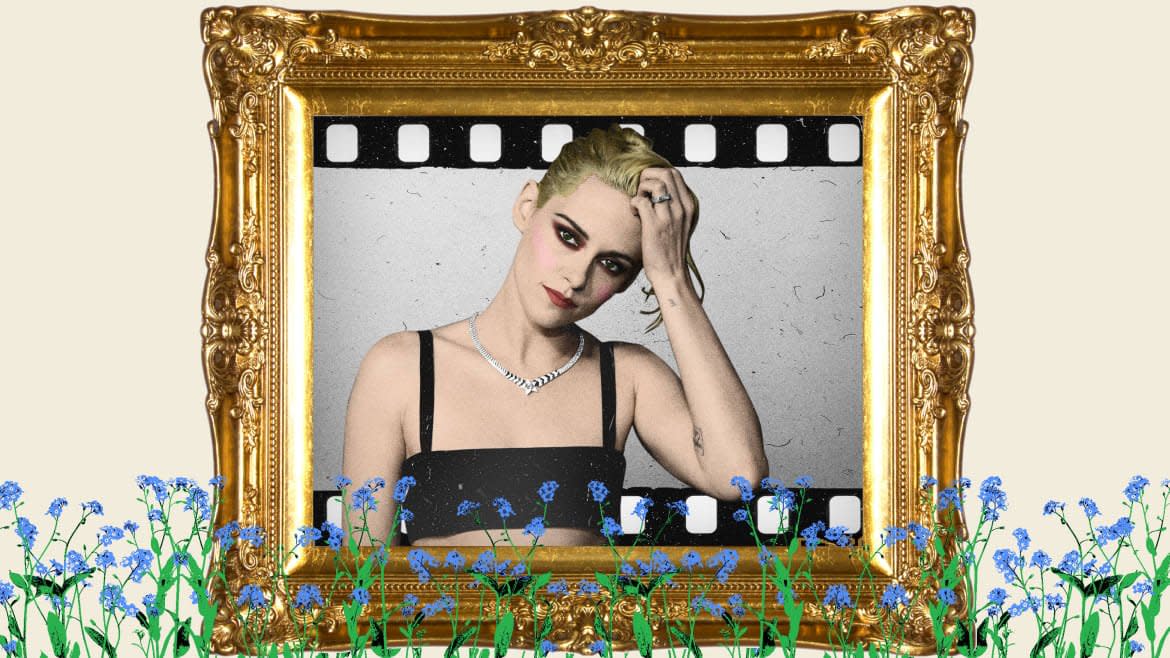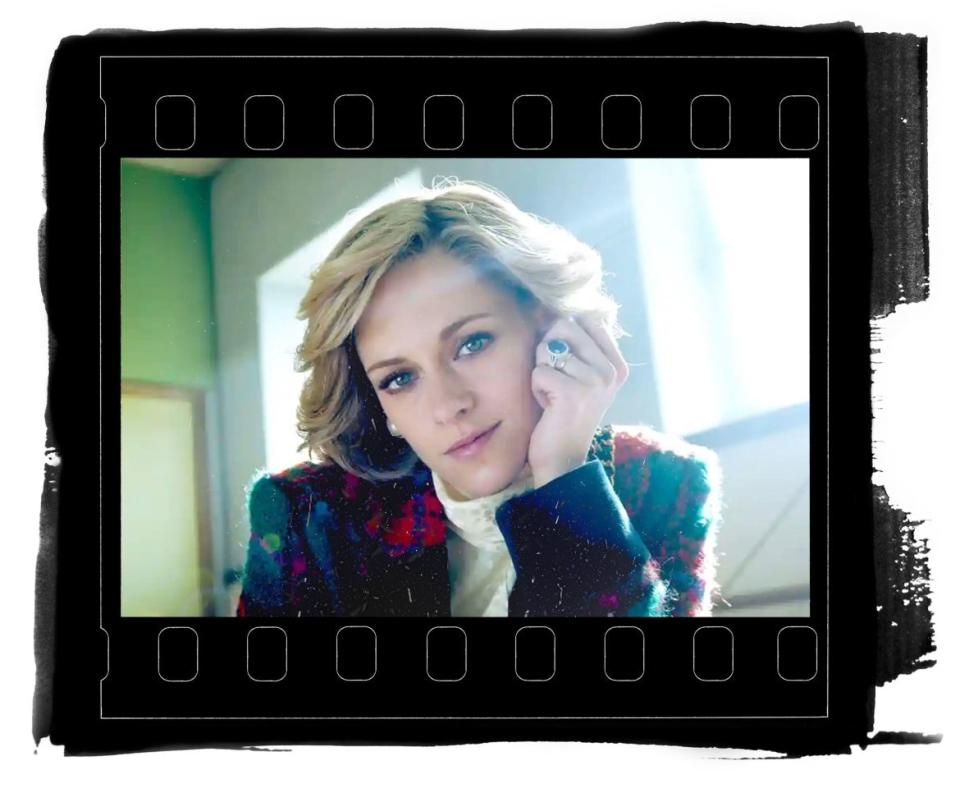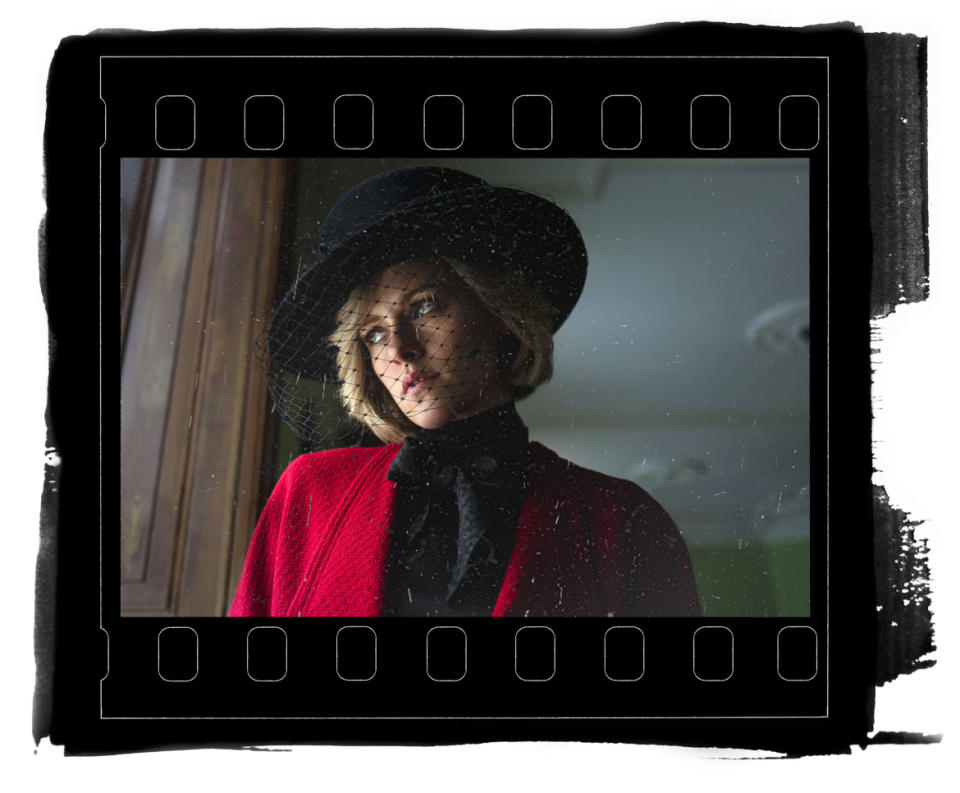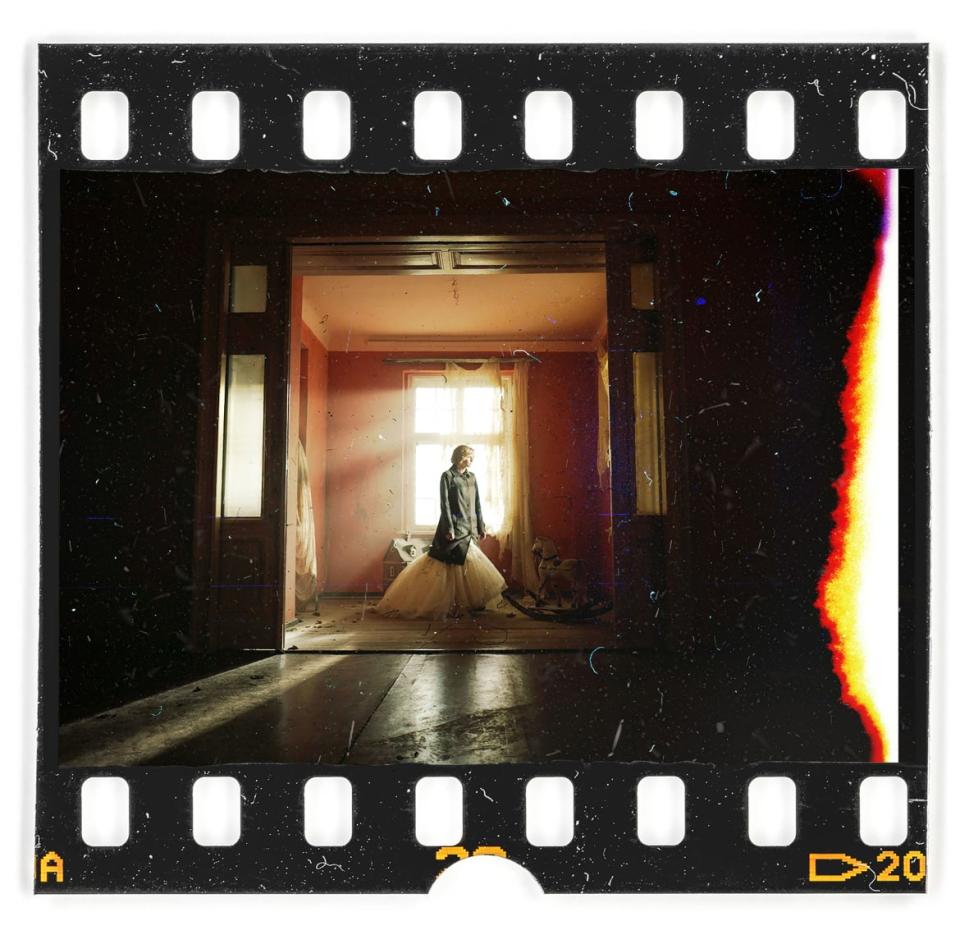Kristen Stewart Has Never Been More in Control

- Oops!Something went wrong.Please try again later.
The casting of Kristen Stewart as the late Princess Diana is a stroke of genius. Who better to capture the abject misery of life in a gilded cage than a former child actress callously pilloried by the tabloid media and gossip-huffing public at the age of 22?
When we first meet her Diana in Pablo Larraín’s Spencer, a companion piece of sorts to his Jackie, she’s already nine years into a tortured relationship with Prince Charles, the unfaithful and unfeeling man-who-would-be-king, and has been stripped of any and all agency. Her appointments, outfits, and meals are chosen for her, and the queen has assigned her equerry (Timothy Spall), a former soldier, to track her every move. The isolation and alienation have become so acute that she’s resorted to binging and purging food, cutting herself, and contemplating suicide. Over the course of three days—from Christmas Eve to Boxing Day, 1990—Stewart and Larraín artfully choreograph Diana’s growing desperation, her performance in lockstep with his roaming camera.
“The music of this movie—the pacing of it, the rhythm, and the impact—rises and falls in unison with all of the elements,” says Stewart. “Claire [Mathon, the cinematographer] and I had an awareness of each other; they had such a good plan in terms of perspective, and how they wanted to capture the images.”
Kevin Smith on Coining ‘Bennifer’ and Trying to Save His Hero Stan Lee
It’s the most confident performance of Stewart’s career—at 31, she has already navigated the Twilight franchise, French arthouse fare, and David Fincher—and that sense of poise extends off-screen as well. In all my years of interviewing Stewart, she’s never seemed more comfortable in her own shoes.
How are you handling all this? This feels like the culmination of a long professional journey for you.
The best I’ve ever been? [Laughs] I’m not actively trying to outdo myself every time, but you want newness, to see how far you can jump, and raise the bar a little higher every time. Having said that, I never approach things from the inside that way. I got lucky with a great group of people and a cumulative curiosity that sparked between all of us. I always think that every movie that comes together and is beatified in its energy—that’s what I define a good movie as being, and I think that’s so rare. They’re like miracles.
You must have known going into this that playing Princess Diana is a pretty loaded thing, and that you would then have to conduct this press tour where you’ve got journalists repeatedly asking you about the parallels between yourself and Diana. Do you think you could have taken on this task a decade ago? Or are you more confident now in your ability to analyze your own celebrity, in a way?
Look, I’m totally down to lean into the comparison conversation. There’s not much of a comparison. It seems pretty obvious—the most striking parallel of our lives being the constant surveillance aspect, or the presence of cameras and lenses in our lives. I’m opening myself in a realm that has a lot of room for me, and that I get so much in return. I think there’s a very clear transactional thing going on between people who take pictures of famous people and the famous person themselves. I’m an artist. I get to say whatever I want. I get to make choices that reflect where I am at a given time in my life. It doesn’t mean that defines me forever. I get to grow. I get to have an ongoing relationship with the public that is completely elective. She was encouraged—and forced, ultimately, until she decided to step away—to perpetuate a lie. I’ve never been asked to do that. I’ve had a lot of people be like, I know you don’t want to compare… I will compare, but they’re different.

There’s certainly a spectrum.
I think the answer that everyone wants is… It’s so funny, because it’s easy to come for someone who victimizes themselves, but what they want is for me to victimize myself in order for them to be able to criticize that victimization. And it’s like, no, I’m fine, and she wasn’t, and it’s very clear what the differences were between the two of us. I think it’s very easy to want to pan someone who’s sad for being famous, and that’s definitely not where I stand.
Have you ever wanted to opt out of it though?
I wish we could divorce one notion from the other.
Because I enjoy few things more than smoking a joint and going to the grocery store, just wandering around my neighborhood in pajamas doing errands, so I can’t imagine a pack of people with cameras following me around while I do that. That’s my chill time. So, have you ever just wanted to take a few years off from it all? Just fuck off to Italy and make shoes like Daniel Day-Lewis?
[Laughs] Not yet. I still smoke my joint and go to the grocery store. You just have to pick and choose what actually matters to you, and how much you want to be a figurehead—or an exemplary figure. I don’t. I definitely don’t make movies to morally reign over everyone or try to answer life’s most difficult questions. It’s definitely about asking them, but I think actors or people in the public eye who are on an honest journey are more fun to watch, and if you can cancel out the noise, the overriding thing that matters is you’re engaged with the world in a profound, expansive way, and to squeeze that sponge for all it’s worth. In my case, it is sopping. I’m so fucking lucky. The fact that there’s people around all the time is… it’s one of those things that’s impossible to complain about, because you’re like, how cool that they are there? You’d have to change people. You’d have to change what we’re interested in, and it’s human nature to hero worship, want to believe in a fantasy, get disappointed when the fantasy doesn’t turn out to be real, but then learn from that. We’re all on a fuckin’ journey, man.
That’s true.
It’s hard to zoom out. If I could figure out whatever legislation would eradicate the nuisance of paparazzi but keep freedom of the press the way it is… there’s no fucking way around it. I want my movie to do well.
You could argue that there doesn’t seem to be a ton of news value to paparazzi shots.
It’s gotten better. I think they make a lot of money, but it used to be a bigger fuckin’ thing.
I think social media has neutered their power to a degree. People treat their Instagram pages like their own paparazzi-esque chronicle of their lives, so it isn’t just people reading Us Weekly on the toilet or whatever to see glamorous photos of beautiful famous people. Famous people can post their own photos of themselves to share with their fans if they want.
You have a little bit more agency. “If they want” is the operative phrase there. And if you don’t, they’ll just take it.
I’m sure there will be hordes of British royal family apologists who come out and say that Spencer is too hard on the royals, and that Diana couldn’t have possibly had it this bad, but anyone who’s actually read Diana: Her True Story, or seen Diana: In Her Own Words, knows that what she went through was far worse than anything that’s been depicted in media.
It’s funny because they do know. It’s weird. I think the reaction that is most typical on the side of royalists who still believe in the institution and revere the family—or work for them—is, I guess it would be easy to criticize our endeavors for “devaluing her beauty” or “trying to take her dignity away from her.” All she wanted was that. She really didn’t want to perpetuate the ideal that was a farce. At some point, the life became so painful that she needed to break away from it violently and start speaking about not only the rejection and inability to comply with the workload and duty aspect of it, but mental health, and her relationship to her body, and her relationship to food and control, and the very few outlets she had to process that pain, and acknowledge it at all, and not allow it to move against her. Fuck—in the last three or four years of her life, she was being incredibly vocal about the experiences that she was having, so for everyone saying, “Why won’t you leave her with her dignity?” it’s like, all she wanted was a mouthpiece and an opportunity to bare herself honestly, because at this point she’d been offered up as a gift to the nation and the world, as though she didn’t own herself. It’s beautiful to think about her repossessing her power and refusing to allow that light to fully go out.
It is.
I think your question initially started off as being about loyal royalists saying, “Why would you take so many liberties?” “Why would you go there?” Why would we go there? Where else would we go! I don’t know where else we would go. You just want to see the picture of her outside in the tiara? We have that. I know it kept a nation—and imperialism—going for a long time, but at this point it’s pretty outdated. The thing that forced her to be more of an empath, and more talented at human connection, and that craving that’s so palpable in her, for that to develop and really come to a head was their fault. She was so isolated at home, and so wanting some warmth and honesty at home that she was not getting. It’s almost like when you talk about a loveless marriage and they say, “You pushed me into the arms of another”—which was the whole world. You pushed me into the arms of the whole world because it was so cold here. And then what happens is they start resenting her for the amount of attention she’s getting and that people like her, so they’re like “We’re jealous.” Well, it’s your fault!
I spoke with Armando Iannucci about the British royal family, and he basically called it a theme park tourist attraction—or their Disneyland, because they don’t have one there. I thought that was an interesting comparison. I mean, they sell plates with their faces on them and shit.
It’s prince and princess—literally Disney stories. It makes total sense, because our stories have changed. We’re not doing the whole Snow White or prince/princess thing anymore for a fucking reason.
When you sell people—particularly young people—on those stories, you’re also promoting “traditional” gender roles.
The oppression of the patriarchy? For sure.
There were a million headlines recently cribbing this quote you gave about how you’ve only “made five really good films.” But it’s crazy how much that one quote was picked up.
God! I wish that I had a perfectly summed-up, astute answer to that, because I know why people fixate on shit like that.

Which is weird.
It was. It’s also just true. This is coming from a standpoint of someone who reveres movies so much that when one fucking hits, and one actually does reveal itself as being the miracle I was talking about before, I wasn’t diminishing my career in saying that. I guess the people that would only really get that, or understand my intention, would be film nerds. People that are like, “I know what she’s saying. Not every movie is a masterpiece; in fact, the reason why you call it that is because it’s rare.” And that’s what we aspire to always. I think I was having a larger conversation about how we’ll never stop trying, and are addicted to chasing, and that it’s all chemical and beyond our control. That’s all I was fucking saying. But it became: “Which ones did you think were good?” “And which ones did you hate?” “And do you have any shit to talk on anyone? Because we love a he said/she said!” It’s all bullshit. English people have their royals and we have celebrities. It’s the same fucking thing.
Well, I counted seven or eight.
Thank you. I sort of ballparked that one, but I suppose if we sat down and went through it… let’s IMDb me. [Laughs]
We’re seeing slightly better LGBTQ representation onscreen now, although sometimes it’s just a morsel—like Marvel placing a gay couple in a few shots and saying, “Look at the great job we’re doing, please clap.” And you’re like… this is the bare minimum.
We want brownie points! Give us brownie points! [Laughs]
I read a quote you gave some years back where you said that someone told you that you’d have to hide your personal life if you wanted to get those types of films—the Marvel films, what have you. I know you’ve flipped the bird to that notion, but what was it like hearing that at the time?
“You have to have less of a real life in order to have a fake one.” Yeah, it’s not something that was so rocking; I just thought it was an exemplary way to have a conversation. Thankfully, it’s becoming much more irrelevant and perspective has opened massively, and there’s much more room. I was thinking about the barely better gay stuff we have to consume in movies lately. The tiny bits, or the overwrought lesbian period drama—that I’ve done. But I was in my bathroom brushing my teeth this morning and thinking, “There should be more! How many shitty fuckin’ love stories between a man and a woman have we seen? So many attempts! And we should be able to messily attempt to tell our stories.” We’re just a little late to the game.
You’re about to do that with your directorial debut, The Chronology of Water.
Yeah. We’re casting it right now. It’s an independent movie and we want it to be small, but we’re in the early stages of development. We’re not in pre-production yet—I would love to be financed at this point—but my hope is that we secure partners by the end of the year. It’s the first time that I’ve had the script, and the deck, and the team come together as a whole and go public in terms of financiers and stuff. I would love to tell you we’re going to shoot it in February… but I think I might be able to tell you that soon.

It seems like there may be a personal connection to this story, since it’s in part about a woman [Lidia Yuknavitch] navigating her bisexuality.
She is overtly bisexual in the movie. Yeah, her relationship to orientation and gender is as amorphous as I find to be honest. I think there’s so much self-delusion, it’s crazy. Obviously, it’s more comfortable to watch stories about yourself, but some of my favorite movies in the world are about people that are not me—people that have a different experience than me and it relates to mine but is different, and so is able to give you a perspective that allows you to become closer to your experience by osmosis. She runs the gamut, though. In a quick sum-up, her life is the most interesting because of the way she finds words. She excavates her voice on paper before she’s ever able to find it physically. Her memoir unlocked me and encouraged me to find my own voice, to put it down on paper, to make it physical and use it out loud. The things that I love the most introduce you to yourself.
Maybe this is just my own bullshit of me reading into how you are, but we’ve talked some over the years and you seem a lot more confident now.
I think that happens to everyone.
Just… getting older?
Yeah! Dude honestly, like, I’m 31 now. I used to be 25. Look at what you were like at 25.
It’s crazy how much was getting put on you in your early twenties, or how much people were reading into things. Because everyone is just trying to figure it out in their twenties.
Oh yeah. I’d have a much different relationship with all the different conversations that were being forced into my fucking lap at that age. In retrospect, I’m like, “Oh! Ask me that again.”
I think you would have been treated a lot differently if it happened now.
Oh, leaps and bounds. Obviously, it’s not perfect, but it’s reflected in the stories that we’re telling, in the questions that I get asked, in my feeling—physically, in my body—in rooms with journalists. It’s shifted completely. Ten years ago, movies were almost exclusively with white stars, almost exclusively about straight stories, all of our actresses were starving to death and terrified and didn’t know what to say in interviews. It’s very clearly like we looked over all of our shoulders and said “Can we stop?” And we are trying to stop doing that. I mean, there are still shreds of that, but if you look back, mental health was not easy. It was a lot scarier and a lot harder to be a human who was not a white man.
“Spencer” is in theaters from Friday, Nov. 5.
Got a tip? Send it to The Daily Beast here
Get our top stories in your inbox every day. Sign up now!
Daily Beast Membership: Beast Inside goes deeper on the stories that matter to you. Learn more.

